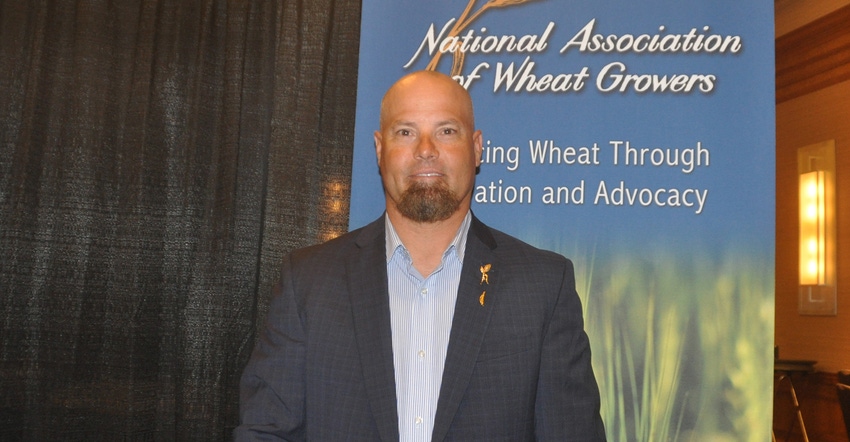
Sharon Springs farmer David Schemm says his first week on the job as the newly appointed executive director of the Kansas Farm Service Agency was filled with long hours and a tidal wave of things to learn.
“It’s been good but a bit a like trying to drink from a fire hose,” Schemm says. “I am stepping into this job with lot to learn and a lot of stuff I have to pick up. But, from a personal standpoint, I have been very happy in the amount of stuff that I do know and understand and I feel comfortable about growing into this role.”
He had praise for his predecessor, for Kansas Secretary of Agriculture, Adrian Polansky.
“Adrian has been great,” he says. “I have already talked to him several times and I called him this week about some stuff. It is awesome to have that experience and background available to help me learn the ropes.”
Schemm says he sees communicating with farmers and helping them to know what programs and assistance is available is a key part of his job. Equally important, he says, is making sure that he is talking to regional leaders and making sure that the needs of Kansans are understood in Washington.
He has set a goal of meeting with all seven FSA district directors in Kansas.
“I started out saying I wanted to do that before the end of 2017,” he says. “That became harder when USDA let us know that it wanted all state directors in D.C. the first week of December. But my goal is still to get out as quickly as possible and meet with those directors.”
Schemm says that he values face-to-face communication when possible to help him truly understand the perspectives of local directors and individual farmers. “I want to put my boots in their dirt; to see things from their point of view,” he says.
The current economic problems in agriculture mean ranchers and farmers need help, and Schemm says he wants to make sure they get it.
“There are a lot of components to FSA, but one place we have seen a huge uptick is in the number of farmers applying tor loans,” he says. “We do have tools to help farmers stay in their operations and weather the downturn. I want to make sure they Kansas farmers get the help they need while also letting the people in Washington know how critical those needs are.”
Schemm says he has concerns about the budget and about gaining certainty with the farm bill program.
“It is troublesome that we are operating on a succession of continuing resolutions that leave so much uncertainty as to what funding will be available,” he says. “The kind of losses people have sustained as a result of weather events such as a late April blizzard, wildfires and floods make it apparent how badly farmers need these programs.”
Schemm says he is focusing on improving the level of service at both state and regional FSA offices including making improvements to the way the software that farmers use to learn about available programs that might help them.
He says he also sees advocating for family farmers as a key part of his role. “We have so many urban people who just don’t understand that 99% of all farms and ranches are operated by families who hope to see a place for the next generation and the one after that remain on the land. They are the ones that do the best job of taking care of the land, of implementing practices that help improve the health of the soil and the purity of water and the cleanliness of the air. It is their livelihood.”
Many of the FSA’s programs are designed to help farmers pay for changes in their operation that aid in the conservation of water and the improvement of the land.
“My own family farm has a long history of conservation,” Schemm says. “All the way back to 1928, my grandfather had more miles of terracing that anyone in the county. We practiced strip till or ridge till back in the 1970s. Today, we embrace new ideas to see what will work better even as we look back at our heritage, at the things that we tried and think about whether new technology might make some of those practices successful even if they didn’t work in the past.”
Schemm, who resigned as president of the National Association of Wheat Growers to take the FSA appointment, says he is happy to spend more time in Kansas and less time in Washington.
“I loved my time at NAWG,” he says. “I love being involved in the industry and I expect to remain active in trying to the best I can to help farmers and the rural communities that rely on the ag industry. I think it is important for the person who leads FSA in any state to have a deep understanding of agriculture. I believe that I do have that and I thought I could best meet my goal of service by taking this appointment.”
Schemm has been active in leadership roles from community, state and national levels. He served as a school board member and president, as well as a member of the extension board. Additionally, he served as president of the Kansas Association of Wheat Growers before becoming president of NAWG.
He has been an advocate for farmers for a number of years on the Field to Market Board, Ag Data Coalition Board, Heartland Plant Innovations, Ag Rail Business Council and various other agricultural organizations. He is a third-generation Kansas farmer, who farms with his wife, son and son’s fiancé.
About the Author(s)
You May Also Like




